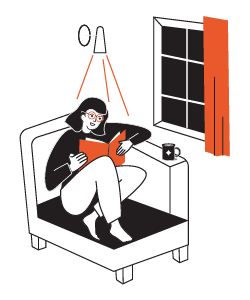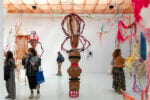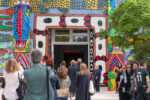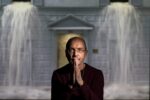Oltre la crisi. Per la pratica del Comune

Incontro sul tema: Dopo lo spettacolo. Riflettere sullo statuto dell’immagine ai giorni nostri.
Comunicato stampa
David G. Torres: Curator. Co-director y co-fundador de A*DESK. Instituto Independiente de Crítica y Arte Contemporáneo. Comisario Pabelló Català i de les Illes Balears a la Bienal de Venecia 2011
Andrea Lissoni: (Milano, 1970) è storico dell’arte e affianca all’attività di ricerca una pratica critica e curatoriale. Si occupa di arte contemporanea con particolare interesse per interdisciplinarietà e ricerche nell’ambito delle moving images.
Mabel Palacin: began her career in the early nineties, and since then her projects have focused on two issues: the status of images in today’s world and forms of artistic output. She has thus been concerned with reflecting on the image as universal language: how new systems of production and dissemination (from mobile phones to social networks) have allowed global access to images, and how these have taken a central role that conditions, affects and explains the present-day social, economic and political reality.
S.a.L.E-Docks: Spazio indipendente e attivista per le arti contempoaranee (www.saledocks.org)
Florian Schneider: Florian Schneider is a filmmaker, writer, and curator. In his work hefocusses on border crossings between mainstream and independent media, art and activism, theory and open source technology. (www.theima )
Gerard Vilar: profesor de Estética y Teoría de las Artes en la Universidad Autónoma de Barcelona, donde es catedrático desde 2002. Ha sido profesor invitado en el Instituto de Investigaciones Filosóficas de la UNAM de México, en el Institut für Philosophie de la Universität Potsdam, y en el Department of Philosophy de la Northwestern University. Es director de la revista de Estética Disturbis desde 2007, y coordinador del Máster de Estética y Teoría del Arte Contemporáneo Pensar el arte de hoy (UAB-Fundació Joan Miró-Museu Picasso). Desde 1995 hasta 2009 dirigió la revista de filosofía Enrahonar.
Focus
Si tratta di fare il punto sullo statuto dell’immagine oggi. Del resto questo è il focus su cui insiste “180”, l’installazione di Mabel Palacin esposta al S.a.L.E fino al 30 ottobre 2011. Con sempre maggior frequenza gli artisti si interrogano sui confini tra video e fotografia, tra produttore e consumatore. Molti riflettono sul ruolo delle tecnologie rispetto alla percezione, sulla molteplicità dei possibili punti di vista, ecc.
Cruciale, inoltre, è il tema della proprietà dell’immagine che va affrontato non solo in termini giuridici, ma illuminando le dinamiche odierne della valorizzazione della cosiddetta dimensione immateriale. Il titolo “Dopo lo spettacolo” allude esattamente a questo aspetto, alla necessità di ripensare l’assunto debordiano per cui lo spettacolo è definibile come “il capitale ad un tale grado di accumulazione da farsi immagine”. Oggi questo paradigma va re-interrogato alla luce della centralità dell’investimento sulle forme espressive del contemporaneo, un investimento che spesso guida lo sviluppo socio-economico di intere porzioni metropolitane
——————————————————————————————————————————–—-—-—-—-—-English version
Friday 16 October 2011, 6pm.
S.a.L.E. Docks, Dorsoduro 265 Venice.
After the Spectacle
Thinking about the meaning of the image today.
The debate will be developed around the question: What is the status of the image today?
We chose this starting point because this is the very focus of “180”, the exhibition by Mabel Palacin on show at S.a.L.E. till October 30. Many artists during the last years concentrated their efforts in questioning the borders between photography and video and the ones between production and consumption. Many are focusing on how technologies are affecting perception and how the possibility of a multiplicity of points of view is constantly growing.
Moreover the theme of the property of an image (which must be approached far beyond the mere juridical sphere) must include the analysis of the common, social and cooperative nature of the process of production today.
The title “After the spectacle” refers to the need of going beyond the Debordian definition in a time in which not only, as Situationists stated, the capital accumulates itself to such a degree that it becomes image, but where images and the so called immaterial domain are often leading the development of our urban and socio-economic landscape.



